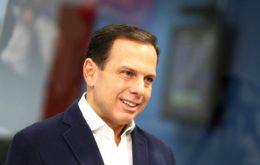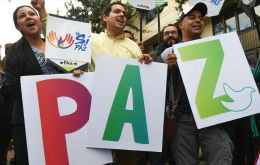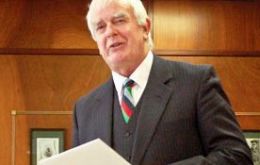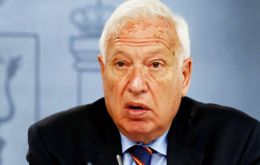MercoPress. South Atlantic News Agency
Politics
-
Saturday, October 1st 2016 - 02:46 UTC
Sao Paulo mayor race has become a puppets' dispute between presidential hopefuls

Next Sunday Brazilians will be going to the polls to elect mayors and councilors in 5.570 cities and towns across the country in what is the first test of the mood of voters since the impeachment of president Dilma Rousseff last month.
-
Friday, September 30th 2016 - 11:24 UTC
Spate of killings ahead of Sunday's municipal elections, the dark side of Brazilian politics

The gunning down of a string of candidates ahead of nationwide municipal elections this Sunday is stoking fears that Brazil's toxic politics are headed into dangerous new territory. The main headline from Sunday's polls is expected to be the hammering of the populist Workers' Party, which many here blame for Brazil's punishing recession and sprawling corruption scandals.
-
Friday, September 30th 2016 - 11:05 UTC
Colombia peace referendum has national support but regional vote shows battle lines

Two public opinion polls released on Wednesday indicate that the recently peace deal between the government with the FARC is likely to be ratified by Colombia’s electorate on Sunday. President Juan Manuel Santos and FARC leader “Timochenko” signed peace on Monday, but before this agreement can be fully ratified, Colombians will vote on the deal in a referendum first.
-
Friday, September 30th 2016 - 10:57 UTC
Gibraltar border must be central to any Brexit agreement, says MEP Ashley Fox

The Conservative Leader and Gibraltar MEP Ashley Fox is to tell the new Secretary for Exiting the European Union that Gibraltar and its border with Spain must be central to any new agreement with the EU.
-
Friday, September 30th 2016 - 07:54 UTC
Falklands would claim 9% oil royalty per barrel plus 26% profit corporation tax

The Falkland Islands government would claim 9% royalty on one barrel of oil, plus 26% corporation tax on profit, confirmed Member of Legislative Assembly Roger Edwards this week.
-
Friday, September 30th 2016 - 07:35 UTC
UN human rights chief reaffirms ongoing collaboration with Colombia peace accord
![Zeid paid tribute to the Government of Colombia […] ”for having the foresight to invite, and then accept and retain, the presence of a UN human rights office”](/data/cache/noticias/56687/260x165/zeid-hussein.jpg)
Speaking to the media just days after the signing of the historic peace agreement in Colombia and ahead of the 2 October national poll in which Colombians will have their say on the accord, the United Nations High Commissioner for Human Rights reiterated that his Office (OHCHR) will continue to follow the progress of the human rights aspects of the agreement.
-
Thursday, September 29th 2016 - 20:08 UTC
London dismisses bilateral dialogue over Gibraltar; “UK's position on sovereignty remains unchanged”

Britain has dismissed a formal Spanish request for bilateral dialogue over Gibraltar, the Gibraltar Chronicle has published. A letter from acting Spanish Foreign Minister José Manuel García-Margallo was handed to the Foreign and Commonwealth Office by a senior official from the Spanish embassy in London on September 20.
-
Thursday, September 29th 2016 - 19:40 UTC
A Falklands' annual event: Chilean Independence Day celebrations

Chilean Independence Day celebrations were again held in the Falkland Islands this year, with the main event being hosted at Government House in Stanley, demonstrating the strong relationship that has formed between Chile and the Falklands in recent decades.
-
Thursday, September 29th 2016 - 18:14 UTC
Overriding Saudi Arabia bill veto, “a mistake and dangerous precedent”, warns Obama

President Obama has said Congress made a “mistake” by overriding his veto and pushing through a bill that allows legal action against Saudi Arabia over the 9/11 attacks. He added that the bill would set a “dangerous precedent” for individuals around the world to sue the US government. Wednesday's vote was the first time Obama's veto power was overruled.
-
Thursday, September 29th 2016 - 12:33 UTC
Catalonia challenges Madrid and will hold an independence referendum next year

Catalonia is to hold a referendum on independence in a year’s time in a move that will infuriate Madrid but which should also return power to the pro-indy campaign in the regional assembly. President Carles Puigdemont told the Catalan Parliament yesterday: “We will look for an agreement (with central government) until the very end, we will at every moment work with the will to hold a referendum in agreement with the state.
